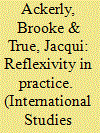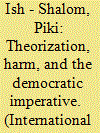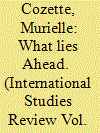|
|
|
Sort Order |
|
|
|
Items / Page
|
|
|
|
|
|
|
| Srl | Item |
| 1 |
ID:
085581


|
|
|
|
|
| Publication |
2008.
|
| Summary/Abstract |
Lately, there has been increasing interest among international relations (IR) scholars in Chinese thought, both as an alternative to Eurocentric IR, and because the PRC as an emerging power will soon have the institutional power to promote its view of the world. Rather than look for suitable Chinese parallels to "international,""security," or other mainstream concepts, this article will examine the concept of "Tianxia All-under-Heaven" to understand Chinese visions of world order
|
|
|
|
|
|
|
|
|
|
|
|
|
|
|
|
| 2 |
ID:
085578


|
|
|
|
|
| Publication |
2008.
|
| Summary/Abstract |
This article traces the general historical development of international relations (IR)
Thinking in Latin American based upon the influence of key intellectual, political, economic, social and cultural factors. In particular the ways in which states needs, foreign policy practices, the development of the social science, and US IR knowledge have influenced Latin American understanding of the "international" science the postwar period are explored.
|
|
|
|
|
|
|
|
|
|
|
|
|
|
|
|
| 3 |
ID:
085573


|
|
|
|
|
| Publication |
2008.
|
| Summary/Abstract |
How can we study power and identify ways to mitigate its abuse in the real world when we, as researchers, also participate in the projection of power through knowledge claims? Informing epistemological perspective, theoretical choices, research design, data collection, data analysis, exposition of findings, and venues for sharing findings, feminism offers many answers. We argue that the most important feminist tool for guiding international relations scholarship is the research ethic. This research ethic is the research practice associated with a critical feminist theory that is reflective of the normative concerns of constructivist, critical, post-modern, and post-colonial theories. It offers International Relations researchers feminist standards for assessing research despite feminism's multiplicity and its defiance of attempts to delimit its practice.
|
|
|
|
|
|
|
|
|
|
|
|
|
|
|
|
| 4 |
ID:
085575


|
|
|
|
|
| Publication |
2008.
|
| Summary/Abstract |
This article explores the ethical relationship between researcher and research subject. In order to address these issues, it examines what reflexivity entails in constructivist research on civil society actors, then discusses briefly how it can differ from highlighting the ethical dimensions of research within other paradigms like realism, liberalism, and feminism. The article also analyzes the types of ethical issues confronted by constructivists, and drawing from the practices of anthropologists, political scientists, and the author's own experiences interviewing religious humanitarian activists, assesses the tasks at hand for constructivists who are serious about understanding the ethical dimensions of their work
|
|
|
|
|
|
|
|
|
|
|
|
|
|
|
|
| 5 |
ID:
085583


|
|
|
|
|
| Publication |
2008.
|
| Summary/Abstract |
One important critique of the "West's" hegemony in international relations (IR) theory has been this theory's inability to come to terms with the problem of difference or the Self/Other dialectic. To further highlight the importance of the Self/Other relations, this article proposes to analyze Russian theoretical discourse of relating to Europe and the West. For centuries, Russia has participated in intense interactions among European, Asian and Middle Eastern regions, and it has developed a language and theories for relating to its various Others. Studying Russian debates can assist us in the task of reflecting on problematic epistemological and ethical assumptions behind IR scholarship, as well as suggest some paths to a genuinely diverse and global IR theory.
|
|
|
|
|
|
|
|
|
|
|
|
|
|
|
|
| 6 |
ID:
085572


|
|
|
|
|
| Publication |
2008.
|
| Summary/Abstract |
The migration of democratic-peace theory from academia to the American political arena resulted in misrepresenting the theory politically. Both the form and content of the political misrepresentation are different from those of the theory. It is argued here that rather, than the theory itself, it is its political misrepresentation that influenced public deliberation and the recent American efforts to democratize the Middle East. Thus, the inputs of theorizing the democratic peace are shown to cause political harms and policy mishaps. Identifying the harms, the mishaps and the theoreticians' indirect responsibilities for them, I conclude that theoreticians are ascribed with political responsibility ensuing in a democratic imperative to show greater concern and involvement in the political destinies of their theories and to participate more actively in the public deliberations that shape policies
|
|
|
|
|
|
|
|
|
|
|
|
|
|
|
|
| 7 |
ID:
085576


|
|
|
|
|
| Publication |
2008.
|
| Summary/Abstract |
This article explores the possibilities of the emergence of a genuinely "post-Western," and less Eurocentric, "critical" international relations (IR) theory through a brief examination of "critical" discourses within two "non-western" cosmopolitan traditions: Islam and Sikhism. It is argued that, although critical IR has created space for the articulation of post-western discourses within the discipline, it continues to speak for and to the West. A genuinely "post-western" critical IR would seek to go beyond mere mimicry of the "derivative discourses" of the modern West by identifying critical discourses on the political from within non-western traditions.
|
|
|
|
|
|
|
|
|
|
|
|
|
|
|
|
| 8 |
ID:
085571


|
|
|
|
|
| Publication |
2008.
|
| Summary/Abstract |
Realism contends that politics is a struggle for power and/or survival, and consequently depicts international politics as a realm of recurrent conflicts among states with very little prospect for change. It is therefore not traditionally regarded as an approach which entertains an idea of progress. E.H Carr famously rejected "pure realism" as an untenable position precisely because it fails to provide "a ground for action," and advocated finding a delicate balance between realism and utopia, as meaningful political action must include both. While realism certainly entails a degree of pessimism, it is far fetched to claim that realist scholars are radically sceptical about the future of international relations. The article investigates Hans Morgenthau and Raymond Aron, two leading classical realist scholars, and argues that neither advocated a strict version of power politics.
|
|
|
|
|
|
|
|
|
|
|
|
|
|
|
|
|
|
|
|
|